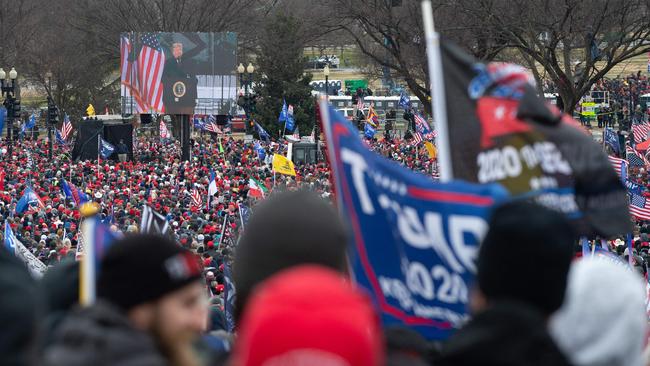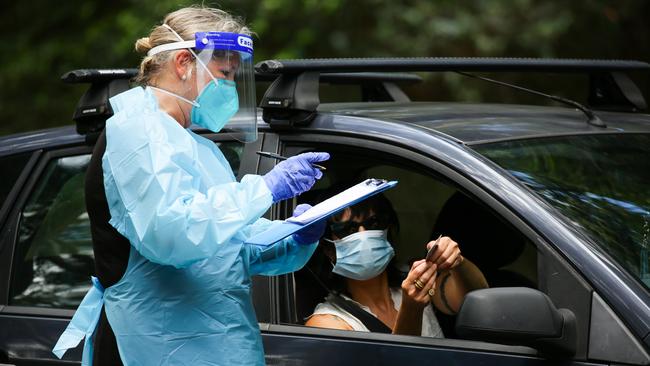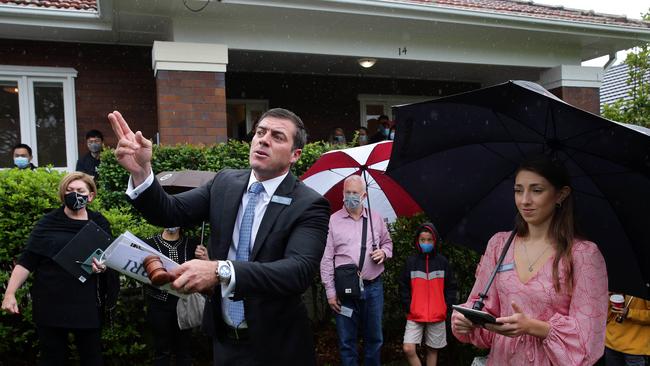COVID-19 sparks battle between ‘haves’ and ‘have nots’, says KPMG
Australia is in an enviable place compared to the strife-torn US right now, but needs to be careful COVID doesn’t divide our own society, KPMG says.
Business
Don't miss out on the headlines from Business. Followed categories will be added to My News.
The Democrats have scored the US trifecta: controlling Congress, the Senate, and the presidency. Regardless of political agendas, it delivers certainty to the world’s largest economy.
But big four consulting firm KPMG has warned underlying social tensions, which propelled Donald Trump to presidency four years ago and spilled into a violent insurrection at the US Capitol building, remains unresolved - a the ground is fertile for a potential situation in Australia as the COVID-19 pandemic accelerates the gap between the ‘haves’ and ‘have nots’.
KPMG chief economist Brendan Rynne is forecasting the Australian economy to rebound to pre-pandemic levels by the end of September, saying the national recovery from COVID-19 will not be as steep as seen in other Western countries.
Dr Rynne said the Morrison government had managed the pandemic well with the economy on track to return to growth. And while the country is battling fresh border closures between NSW and Victoria, it has not plunged into a full lockdown again like in the UK, nor is the health system being overwhelmed with COVID cases like in the US, where in California the virus is infecting one person every eight minutes.

“Our government has managed this pandemic very, very well, both from a health perspective and also from an economic perspective as well,” Dr Rynne said.
“The impact of that is we should also expect our recovery to not necessarily need to be as strong. Our volatility in economic activity has been a bit more muted than what we have seen overseas, fundamentally in what we’ve seen in the positive policy environment, both from a health and economic perspective.
“The outlook from us is one that is going to improve and growth will have that momentum notwithstanding that we do have those little bumps at the moment.”
But like social divisions in the US erupting into Wednesday’s insurrection, challenges remain.
Dr Rynne said while the US had political and economic certainty, steep social divisions continue to remain unresolved and present one of the biggest challenges for President-elect Joe Biden.
“Regardless of what your politics are, from the perspective of a smooth functioning of the economy, what you have now got is certainty. Businesses know what their platform is, they understand what they are likely to be implementing over the time in office, and also the community in America can now deal with much more certainty than if they had a divided Congress and Senate,” Dr Rynne said.

“But nonetheless, the events of today (Wednesday’s riot) shows you the social division that is clearly in existence in America, and that’s going to be a real challenge for any political leadership regardless if you have got control of the upper of lower houses. One of the things to recognise is the social setting and also the individual economics of people may be feeling that brought President Trump to power haven’t been resolved.
“Much of that social division, particularly in the Midwest, because it hasn’t been resolved, is likely to continue to fuel social discontent in the US. So in terms of political agendas, trying to resolve those underlying problems within the community, within the US, is something clearly political leadership needs to be dealing with.”
In Australia, the Reserve Bank slashing interest rates to nearly zero, while embarking on a $100bn bond buying program, has flooded the country with cheap money to aid the COVID recovery, fuelling concerns of an asset bubble forming and potential social discontent.
Dr Rynne said while the RBA had no option — although the effectiveness of quantitative easing (QE) is still playing out — “it was essential for business confidence that the RBA was seen to be doing all it could to support the economy”.
“While we support the RBA’s use of QE, there are side-effects. History tells us that in period of QE and/or balance sheet expansion by central banks, price inflation emerges in assets like houses, shares and bonds, and we are already seeing this occurring,” Dr Rynne said.
“The issue is that rising asset prices will further exacerbate the difference between the ‘haves’ and ‘have-nots’ in society. Those with assets going into the pandemic will see their wealth rise with the tide; those that didn’t will see the gap widen.”
And the effect appears it will be long-lasting. Denmark, which has had negative central bank interest rates since 2012, is offering homeowners 20-year loans at a fixed interest rate of zero — an indication that no western central bank will look to hike interest rates soon.
To combat asset price bubbles and rampant inequality, Dr Rynne said the government must look at tax reform — such as capital gains and negative gearing — to “dampen the attractiveness of housing investment”.
“Ensuring lending standards are maintained to protect borrowers from overextending themselves — including maintaining serviceability stringency and enforcing loan to value ratio limits — can (also) help minimise the chances of an asset price bubble.”
To further put the brake on inequality, KPMG Australia national chairman Alison Kitchen called on the federal government to retain the rate of JobSeeker payments.
“We have seen JobKeeper and JobSeeker used very well during the pandemic last year to support our whole country’s response to COVID-19, which has been extraordinary compared to many other countries,” Ms Kitchen said.
“But obviously with the JobSeeker reduction coming into place on December 31, while it’s still above Newstart, it’s still below the area we have been recommending for many years as a sustainable level.

“So we would like to see the government as a minimum come out and say that’s been locked in as the permanent level, rather than leave ongoing uncertainty. We think it’s now dropped to a level where there is a meaningful gap between JobSeeker and the minimum wage, and therefore it’s doing its job as an incentive to go out and look for work.”
Returning to office work is also presenting a conundrum, along with the fresh border closures between NSW and Victoria as well as border restrictions in Queensland.
Ms Kitchen said the fresh spike in COVID-19 cases, which spread from Sydney’s northern beaches to elsewhere in the city and has seeded in Victoria, could not come at a worst time and warned of potential consequences from a fatigued workforce.
“I’m conscious that exactly during this week last year — while I was on holiday — I spent quite a lot of the week on the phone with our office dealing with our bushfire response and what we were doing with emergency workers, with people stranded in unsafe places, etc.
“Quite a few people came back to work in February with nothing but scars from their traditional January holiday period. They had been quite traumatised.
“And now this year, some of those people had plans to go on holiday that got disrupted, they got stuck in the car or didn’t go to Queensland and all of that stuff.
“People that were working at home for eight or nine months last year, were actually looking forward to a real break and going away somewhere, and for a lot of them again it’s been disrupted.
“It won’t decimate our economic ability to keep operating but you do have to recognise people are tired and really wanted to relax and recharge over this period.”
Ms Kitchen said KPMG was committed to employing 500 graduates in March but the firm was questioning whether to include last year’s intake in this year’s program as well.
“We on-boarded 500 graduates in March 2020, and we’ll on-board another 500 in March 2021. And the people we on-boarded in March 2020 almost wholly missed out on 90 per cent of the things that are good about joining KPMG as a graduate in terms of the social interaction, the ability to immediately get involved in meeting people and going to meetings as a note taker and see what happens in big transactions, get that variety. They haven’t experienced any of that.
“We are looking at the program and hopefully we can roll out something exciting for the 2021 graduates but will we have to go back and include last year’s. Even though they have been with us for months, they have missed out on an enormous amount of that normal activity.”
Originally published as COVID-19 sparks battle between ‘haves’ and ‘have nots’, says KPMG





